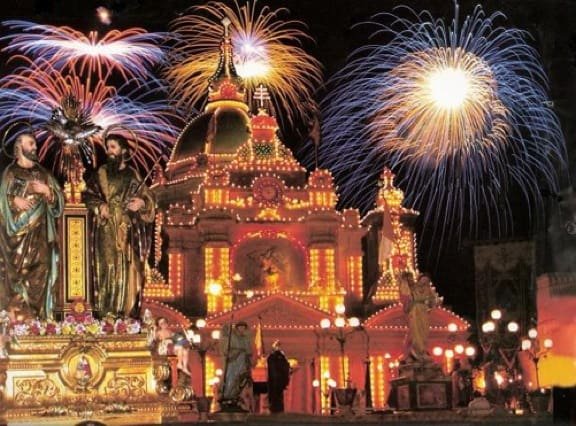Chronos, Kairos and Aion are the three deities of time, events and epic destinies. Here is the multi-religious and multicultural calendar!
Find us on our website Mythology and Legend, on Facebook and on instagram !

The schedule in brief from D-2 to D+5
- August 18, 2024, : Zhongyuanjie
- August 19, 2024, : Buhe
- August 19, 2024, : Ibumin Earoeni
- August 19, 2024, : Saint Maginus
- August 19, 2024, : Vinalia
- August 20, 2024, : Our Lady of Sorrows
- August 21, 2024, : Consualia
- August 23, 2024, : Grand Magal of Touba
- August 23, 2024, : Vulcanalia
- August 24, 2024, : Kamyshin Watermelon Festival
- August 24, 2024, : Saint Barthélemy
- 25 August 2024, : Arbaïn
- 25 August 2024, : opiconsivia
The complete interactive calendar
June 28, 2024
–
June 28, 2024

Today, the Maltese celebrate Mnarja, Saints Peter and Paul. It dates back to the time of the Knights of Malta in the 16th century. The name derives from the Latin word “Luminare”, meaning to illuminate. And it was precisely the lighting of candles and torches that made people feel their participation in the celebrations. However, over the years, the festival is no longer just a religious commemoration, but has changed its face, being enriched with new elements. Typical traditional dishes, parties, bonfires and fireworks show the best of Maltese folk tradition. #mythology #myth #legend #calendar #June 28 #mnarja #Malta
Multicultural and multi-religious almanac
An almanac is a calendar showing the main dates of the calendar, the religious holidays, bearing ephemerides such as the phases of the moon or the duration of the days (lunar and solar calendars).
A calendar is a system for marking dates according to time. Such a system was invented by men to divide and organize time over long periods. The observation of the periodic phenomena of the environment in which they lived — such as the daily movement of the shadow, the return of the seasons or the lunar cycle — served as the first references for organizing the agricultural, social and religious life of societies.
The calendar used today in most of the world is the Gregorian calendar. In everyday language, an ephemeris designates what happens daily; the ephemeris of the day is the list of the significant events of this day.